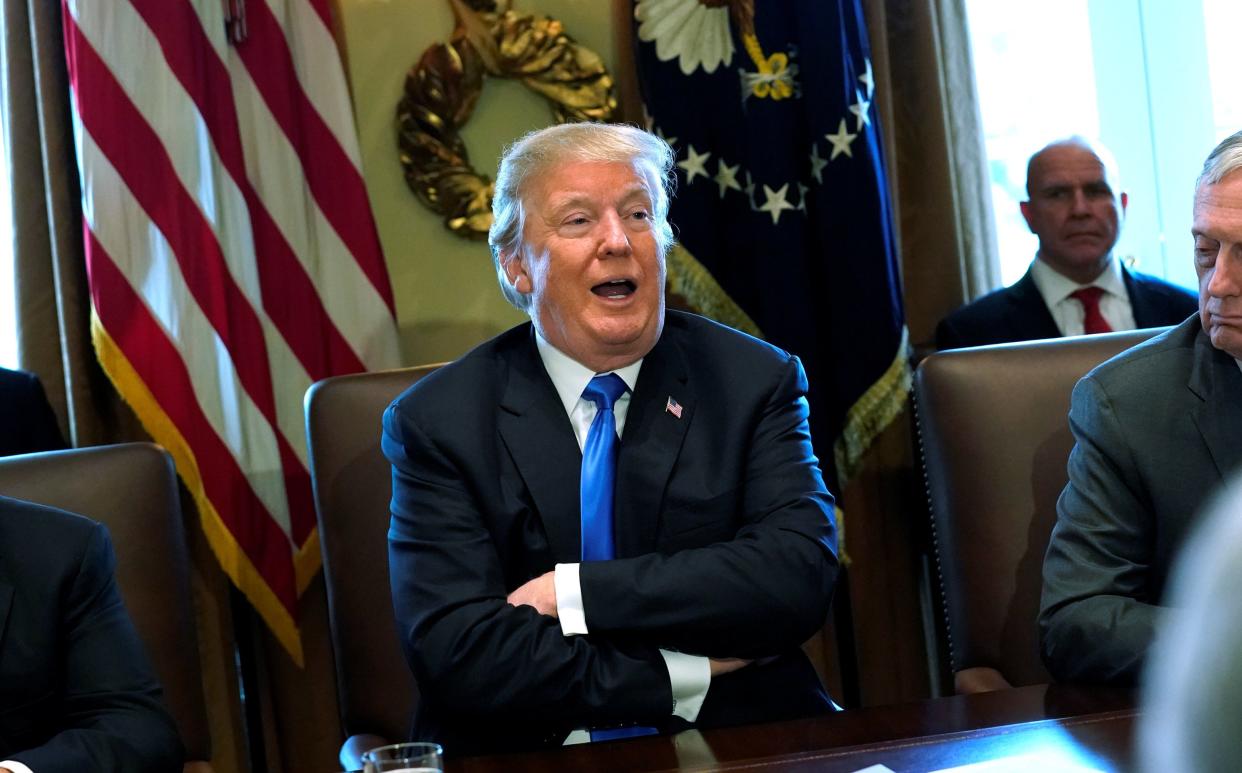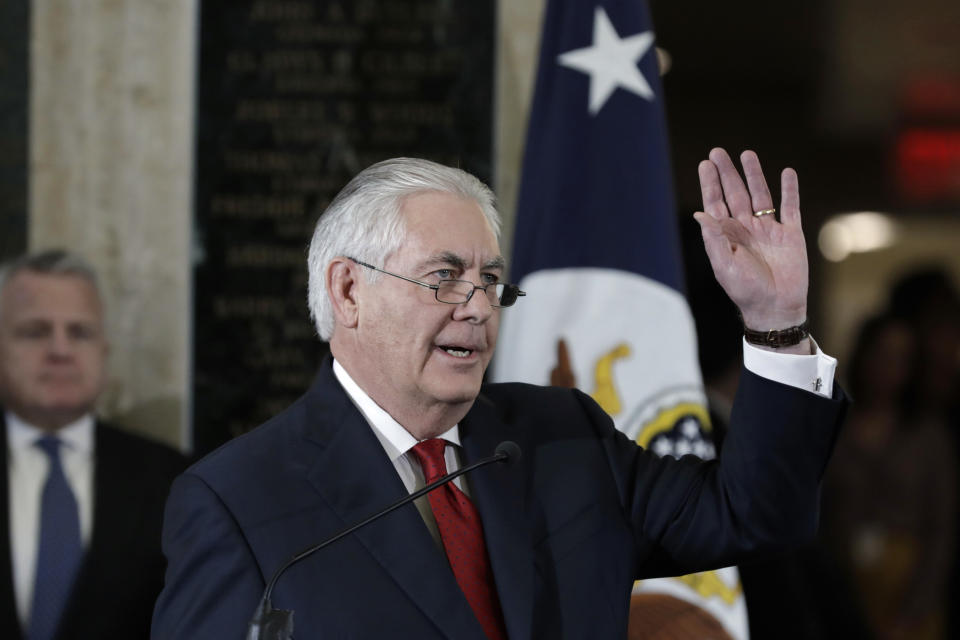Opinion: Trump Wants His Cabinet To Serve His Ego, Not The Nation

In commenting on his decision to remove Secretary of State Rex Tillerson from his position last week, President Donald Trump explained to reporters at the White House, “We were not really thinking the same. Really, it was a different mindset, a different thinking.”
That different way of thinking had been apparent from the start of Tillerson’s stint at State, visible not only in the secretary’s disagreement with Trump on how best to handle North Korea, but also in the pettier matters that have come to define this pitiful presidency. Tillerson, a former Eagle Scout, reportedly objected to Trump’s gross politicization of his visit to the Boy Scout Jamboree over the summer. And he found the president’s ability to command basic facts so unimpressive that he reportedly referred to Trump as a moron in front of other administration officials.
While the coming negotiations with North Korea’s Kim Jong Un provided a useful cover for Trump’s hasty actions, Tillerson’s exit really owed to his failure to fall in line with the president, something Trump assured reporters would not be a problem with his new appointee to State, Mike Pompeo. “We’re always on the same wavelength,” Trump said of Pompeo.
Perhaps anticipating more criticism of the continually revolving door that is the White House these days, Trump defended his move. “I’m really at a point where we’re getting very close to having the Cabinet and other things I want,” Trump explained, as if the West Wing’s constant turnover was some refining process of personnel rather than a crisis of presidential leadership.
On Thursday, Trump continued his staffing shuffle, naming John Bolton as his new national security adviser in place of H.R. McMaster. Trump’s selection of Bolton, the warmongering U.S. ambassador to the United Nations under George W. Bush, is a chilling prospect for those who hoped Trump’s saber-rattling with North Korea might be tempered by cooler heads inside the White House. Bolton is an aggressive hawk who is certain to cheerlead Trump’s worst impulses.
All of these moves undercut Trump’s businessman boasts that he would bring only the “best people” to Washington, of course. But they also make plain that the real business of this administration is to serve Trump’s ego rather than the nation. In cutting out dissenters or even strong counterweights in his administration for the steady stream of sycophants and, let’s not forget, fawning family members he has gathered around him, Trump has ensured his White House will never be mistaken for Abraham Lincoln’s “team of rivals.” Instead, Trump is assembling a cabal of cronies.

In early American administrations, presidential Cabinets often included fractious elements who battled with each other and their president over what the young nation’s course should be. But Lincoln’s decision to appoint the three men he had defeated for the Republican nomination in 1860 – William Seward, Salmon Chase, and Edward Bates – along with three former Democrats to his Cabinet established the adversarial model that subsequent presidents would follow.
Franklin Delano Roosevelt may have best continued the tradition. Faced with the challenges of leading the country through the Great Depression and up against a Republican Party that wanted him to fail, FDR might have chosen a Cabinet that affirmed his every step. Instead, Roosevelt selected a team of advisers notorious for arguing and rarely in agreement. Believing the best ideas would arise out of this maelstrom, FDR understood that he would have to first take on counterarguments inside his own ranks if he hoped to bring about the large-scale changes he desired for the country.
Other presidents followed suit. John F. Kennedy chose two Republicans to fill spots in his Cabinet, a move he hoped demonstrated a bipartisan spirit after a razor-thin win over Richard Nixon in 1960. Just as FDR had wanted his staff to challenge his ideas on how to deal with the nation’s economic crisis, JFK purposefully sought voices of disagreement as he determined how to handle the escalating tensions with the Soviet Union. The strategy paid off during the Cuban missile crisis.
More recently, George W. Bush assembled a Cabinet that included powerful, qualified officials, including Robert Gates and Colin Powell, to fill in the spots where his inexperience would show. (Trump has shown no similar thoughtfulness about how a carefully selected Cabinet could help cover up his glaring inadequacies as chief executive.)
Barack Obama frequently cited Lincoln’s “team of rivals” style of leadership as the reason for stocking his administration with his former competitors for the Democratic nomination, Joe Biden and Hillary Clinton, and picking three Republicans for his Cabinet. (One of those, Sen. Judd Gregg of New Hampshire, withdrew from consideration before he was confirmed as secretary of commerce, however.)

Trump is no student of history, certainly, and his leadership style veers more to the impulsive than the pragmatic. Still, it’s worth taking stock of the personality cult Trump has built for himself inside the White House, and what it means for the nation that he is using the presidency as his personal form of therapy.
Staff members provide Trump with folders twice a day filled with favorable news articles, flattering tweets, and even pictures of the president for him to pore over. This for a man who can’t be bothered to read national security briefings, we might remember.
Recall also the Cabinet meetings that have begun with Trump calling on each member to praise him and express appreciation for working for him. Other presidents usually prefer hearing updates about the work those secretaries’ departments are carrying out, but Trump has made clear to those around him that what he most wants to hear is how well they think he is doing. The nation can take care of itself.
That’s not to say there’s no pushback. But Tillerson’s experience shows what a self-defeating approach that voicing dissent can be in this White House. Jeff Sessions may be the next to learn the lesson. Although one of Trump’s first and most enthusiastic backers, Sessions now finds himself on the outs with the president and possibly next in the firing line due to his refusal to follow some of Trump’s ideas about how to use the Justice Department.
Whether Sessions stays or goes, Trump will continue to use the threat of expulsion to draw out unquestioning adherence and unwavering loyalty – his favorite word – from those around him. But most of that effort will be merely for show. Trump consults few of his advisers, in fact, and relies mostly on his own flawed and impetuous judgment. In the end, this emperor has no close associates.
Frighteningly, Trump’s tendencies for isolation and self-direction will only increase in whatever time he has left in office. As The New York Times reported this week, Trump, having grown confident in the role of president, now feels “newly emboldened” to ignore the advice of those around him and follow only his own instincts.
After more than a year in office, Trump may have finally found his sea legs. But that doesn’t change the fact that he’s captaining the Titanic while his obsequious lackeys in the White House quietly rearrange the deck chairs.
Neil J. Young is a historian and author of We Gather Together: The Religious Right and the Problem of Interfaith Politics. He hosts the history podcast “Past Present.”
ALSO ON HUFFPOST OPINION
The Stormy Daniels Saga Shows How Vulnerable Trump Is To Blackmail
Democrats' Surrender On Torture Is Nearly Complete
The Oversight Storm That Could Paralyze The Trump Presidency
Love HuffPost? Become a founding member of HuffPost Plus today.
This article originally appeared on HuffPost.

 Yahoo Movies
Yahoo Movies 
